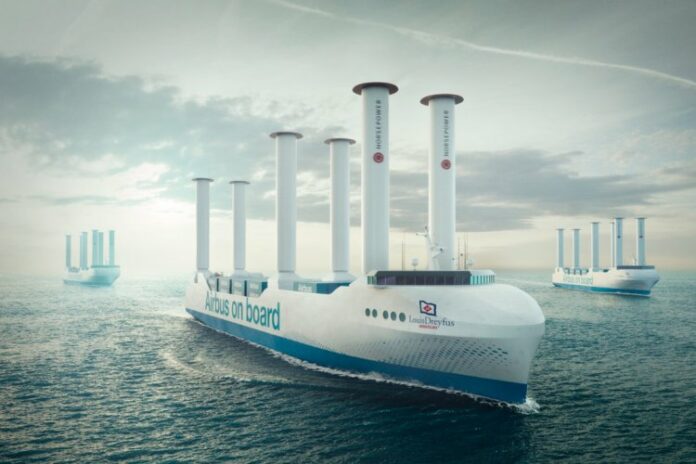Following delivery by China’s Wuchang Shipbuilding from 2026 onwards, the innovative vessels will carry Airbus A320 Family jetliner subassemblies from France (Saint-Nazaire) to the final assembly line in the United States (Mobile, Alabama).
The ships have been designed by Deltamarin with the aim of halving fuel burn and CO2 emissions in transatlantic operations by 2030 compared to a 2023 baseline.
Wind power drawn from six Flettner rotor-sails on each ship’s deck will make a strong contribution to reduced emissions, with weather routing optimization software also in place to maximize wind-assisted time and minimize drag. In conventional mode, the ships will run on dual fuel methanol engines.
Optimizing propulsion performance at all times will rely on integrated power management and propulsion systems from BERG. LDA has specified the supplier’s extensive engine-agnostic propulsion package for newbuild ships. As well as the complete propulsion train to work with each ship’s main engines, BERG is supplying state-of-the-art controllable pitch propellers with feathering capability.
Amrita Singh, Account Manager, BERG Propulsion, explained that the BERG hybrid solution allows main engines and electric motors to drive propulsion either independently or simultaneously so that the most efficient power option is used as a vessel’s operational needs change.
“The system works with alternative power sources, including wind,” said Singh. “It’s key when integrating sails that they work seamlessly with propulsion controls so that adjustments can be made to thrust in any given weather and sea condition. In BERG’s solution, Dynamic Drive is integrated into the MPC800 control system, which delivers this capability without the operational complexity of additional hardware.”
“The propulsion package includes a range of ‘modes’, whose selection optimizes performance across the ship’s various operational requirements,” explained Mattias Dombrowe, Business Manager – Electrical System Integration, BERG Propulsion. “As well as mechanical with PTO or electric modes, propellers also operate in boost mode to achieve full speed when required. When the rotor sails are in service, one or both of the propellers can be feathered to optimize wind-assisted operations.”
Crew continuously optimize efficiency using the flexibility available to the propulsion control unit, rather than being limited by the predetermined relationships between engine load and specific fuel oil consumption, said Dombrowe.
When upgraded to include Dynamic Drive, the Berg Propulsion’s MPC800M system is enabled to set upper limits for vessel speed or fuel consumption by optimizing the pitch and rpm of the control pitch propeller. If the speed limit is exceeded, Dynamic Drive automatically reduces thrust until the limit is met. If fuel is the priority, the algorithm selects the rpm/pitch to optimize engine performance.
“Data from the initial trials showed MPC 800 control system achieving around 10% fuel reductions, and our expectation is that there is more to come as the system beds into operations,” said Ersen Uçakhan, Technical Manager, Chemfleet. “We will upgrade YM Neptune, YM Pluto and YM Uranus later this year, continuing our successful collaboration with Berg Propulsion on this exciting project.”
The opportunity to replace the existing controls system from another supplier with Berg’s MPC800 system on YM Miranda was accomplished in three days. Özgür Bartınlı, Service Manager, Berg Propulsion, explained that the system offers the open architecture for software upgrades as required.



